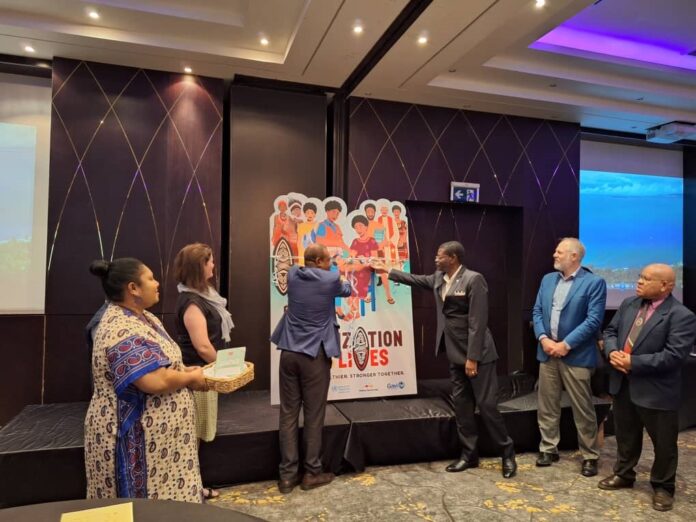By DALCY LULUA
THE National Department of Health (NDoH), in collaboration with United Nations Children’s Fund (UNICEF) and other partners, have launched a comprehensive Routine Communication Immunisation Toolkit to improve communication and advocacy for immunisation in the country.
Developed in partnership with UNICEF, the toolkit was launched by Secretary Dr Osborne Liko, witnessed by UNICEF Country Representative Dr Claudes Kamenga, Anna Gilchrist (First Secretary – Health, Australian High Commission) and other partners.
Acting Programme Manager Martha Pogo said Papua New Guinea has 13 vaccinations (antigens) in the country.
“When we are talking about the national immunisation, we are talking about vaccines and as per the World Health Organisation’s (WHO) recommendation for developing countries, we are supposed to have 13 vaccines (antigens) just like any other developing countries,” she said.
“As for PNG, we have 12 vaccines; the 13th one is the COVID-19 vaccines and it is for adults, while the 12 vaccines are childhood vaccination.”
She said the National Immunisation Strategy (NIS) that guides all immunisation activities in the country has nine strategic areas in the National Immunisation Framework (NIF).
“The occasion we are here to partake and witness falls under strategic priority number nine which is ‘advocacy, communication and demand generation’ for all Expanded Programme Immunisation (EPI) activities in the country.
“As per the NIF, the country should have targets to achieve in terms of measuring our performance in immunisation.
“The NIF targets is by 2030 PNG should be at 80%, now we are in 2024, we are supposed to be at 65% but we are at 40% that means we are behind to get all children vaccinated, we have a key role to play if we want to see the outcome and we are launching this as a key tool to help us to advocate,” she added.
She highlighted the challenges of accessibility of the vaccines and the delivery modes used for the vaccine’s delivery.
“When we talk about EPI service delivery, it’s either fixed, mobile, outreach or patrol.
“When it comes to vaccination, either we take the vaccines to where children are, do it during the day hours and bring the remaining back to the health facility or the health workers go and overnight, walked distances, they crossed the river, they climb mountains to go and give vaccines.
“They sleep there for weeks and days, these are the modalities in PNG.
When we look and fixed and mobile and part of mobile, we can only reach 40% of the target population of children and when we look at outreach patrol, we reached 60% of the of the target population and outreach and mobile however, it’s another cost and funding involve to move the vaccines around,” she added.
UNICEF Representative Dr Satish Gupta stressed on strategic interventions to drive demand for Routine Immunisation and reach zero-dose children.
“We must Improve financing for immunisation programme, improving service delivery to reach zero dose and missed children, ensure sustained availability of potent vaccines and supply and generate demand to improve acceptance and uptake of vaccines and addressing gender barriers,” he added.
Dr Gupta said the immunisation kit was focused on; improving vaccine literacy, promoting health seeking behavior, vaccination of women against tetanus, building trust and visibility in health services, the importance of community participation and advocating for population immunity.
Meanwhile, Health Secretary Dr Liko emphasized that immunisation is a highly cost-effective public health intervention, crucial for saving lives from vaccine-preventable diseases, particularly those impacting children.
Expressing deep concern over the fact that less than 50% of children in PNG have received essential vaccines in the last five years, he stressed the urgency of addressing the barriers contributing to this situation.
“It is imperative that we recognise the various challenges hindering routine immunisation in PNG and collectively work towards overcoming them,” Dr. Liko urged.
“These challenges include limited human and financial resources, vaccine shortages, distribution difficulties, dispersed rural populations, an aging workforce, rugged geography, and illiteracy. He identified misinformation, service delivery hurdles, limited access to immunisation services in rural areas, and a pervasive lack of motivation and awareness as key factors contributing to low immunisation coverage.
Dr Liko highlighted the importance of a newly introduced toolkit designed to enhance community awareness and demand for vaccines.
“We must dispel myths and fears surrounding immunisation, strengthen health service delivery in remote regions, and ensure that families can easily access immunisation services,” he emphasized.
Additionally, he stressed the significance of awareness creation, community engagement, collaboration with religious and community leaders, and the reinforcement of interpersonal communication among healthcare providers in garnering support for routine immunisation.
The RI toolkit will be sent to PHAs and comprise of: Child Health Record Book; Out of Home / English and amp; Tok Pisin Billboards – Canvas Banners – Pullup Banners; Collaterals: Counseling Card – FAQ Brochure – Poster Immunisation Calendar -IPCI Sticker- IPCI Manual -Pocket Guide for Religious Leaders; Merchandise: Cap – T-Shirt; Tote Bags; Umbrella; Vest; Water Bottle and Wrist Band; social media: Static tiles and amp; Factoid reels; Audiovisual: Radio and amp; TV PSAs; Jingles.


